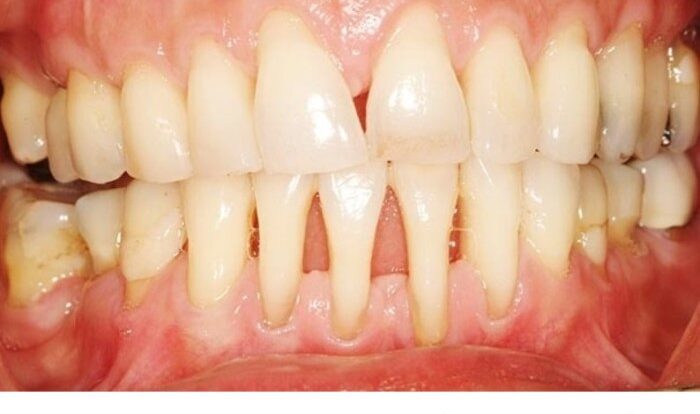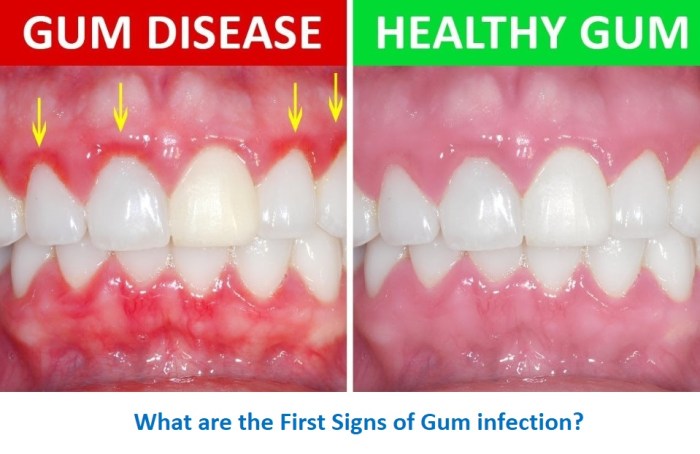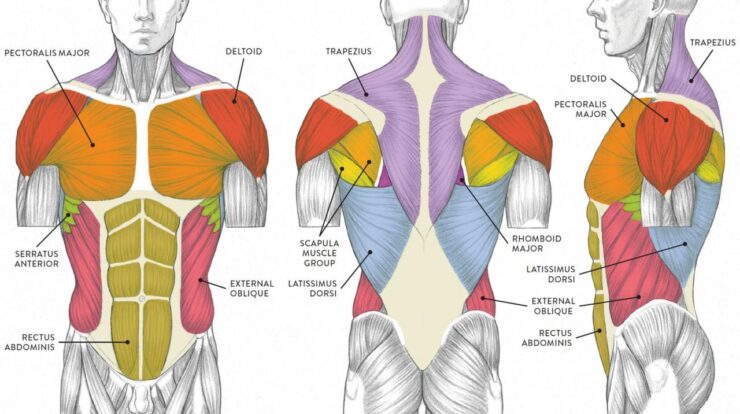
Struggling with gum disease? Don’t despair! You don’t always need a dentist to get relief. Dive into our guide on how to cure gum disease without a dentist, where we’ll explore effective home remedies, essential oral hygiene practices, and lifestyle changes that can help you restore your gum health.
From natural ingredients to proper brushing techniques, we’ve got you covered. Get ready to say goodbye to gum inflammation and hello to a healthier smile!
Home Remedies for Gum Disease
Gum disease, also known as periodontal disease, is a common oral health issue that can cause a range of symptoms, including bleeding gums, gum recession, and tooth loss. While professional dental care is the most effective way to treat gum disease, there are several natural remedies that can help alleviate symptoms and support oral health.
These remedies work by targeting the underlying causes of gum disease, such as bacteria and inflammation. They can be used in conjunction with professional dental care to improve outcomes and prevent further progression of the disease.
Natural Ingredients for Gum Disease
- Salt water rinse:Salt water has antibacterial and anti-inflammatory properties that can help reduce gum inflammation and kill bacteria. Mix 1/2 teaspoon of salt in 8 ounces of warm water and rinse your mouth for 30 seconds, twice a day.
- Baking soda:Baking soda is a natural alkalizing agent that can help neutralize acids in the mouth and reduce inflammation. Mix 1/2 teaspoon of baking soda in 8 ounces of warm water and rinse your mouth for 30 seconds, twice a day.
- Tea tree oil:Tea tree oil has potent antibacterial and anti-inflammatory properties that can help fight gum disease. Add 2-3 drops of tea tree oil to 8 ounces of warm water and rinse your mouth for 30 seconds, twice a day. Note:Do not swallow tea tree oil, as it can be toxic if ingested.
- Green tea:Green tea contains antioxidants and anti-inflammatory compounds that can help reduce gum inflammation and prevent gum disease. Brew a cup of green tea and let it cool. Rinse your mouth with the tea for 30 seconds, twice a day.
- Aloe vera:Aloe vera has soothing and anti-inflammatory properties that can help reduce gum pain and inflammation. Apply aloe vera gel directly to the affected gums, or mix it with water and rinse your mouth for 30 seconds, twice a day.
Note:It is important to use these remedies in moderation and as a complement to professional dental care. They should not be used as a substitute for regular dental checkups and cleanings.
Oral Hygiene Practices for Gum Disease Management

Maintaining proper oral hygiene is crucial in preventing and managing gum disease. Implementing a comprehensive oral hygiene routine that includes effective brushing, flossing, and the use of mouthwashes can significantly reduce the risk of developing or worsening gum disease.
Brushing and Flossing Techniques
Proper brushing and flossing techniques are essential for effective plaque removal and maintaining gum health. Brushing should be done at least twice a day, for a duration of two minutes each time. Use a soft-bristled toothbrush and fluoride toothpaste, and brush in gentle circular motions, covering all surfaces of the teeth.
Flossing should be done once a day, using a gentle back-and-forth motion to remove plaque and food particles from between the teeth.
Mouthwashes and Other Oral Hygiene Aids
Mouthwashes can be an effective adjunct to brushing and flossing, as they can help kill bacteria and reduce inflammation. Choose a mouthwash that contains fluoride and antibacterial ingredients, and use it as directed on the label. Other oral hygiene aids, such as tongue scrapers and interdental brushes, can also be beneficial in removing plaque and bacteria from hard-to-reach areas.
Dietary Considerations for Gum Disease

Gum disease is a prevalent issue affecting millions worldwide, and maintaining good oral hygiene is essential to prevent its development. Diet plays a significant role in gum health, as certain foods and nutrients can either promote gum health or worsen the condition.
A balanced diet rich in essential nutrients is crucial for overall well-being, including oral health. Let’s delve into the dietary considerations that can help manage and prevent gum disease:
Foods and Nutrients for Gum Health
- Vitamin C:Vitamin C is a potent antioxidant that helps strengthen the immune system and protect against inflammation. It is found in citrus fruits, berries, and leafy greens.
- Vitamin D:Vitamin D supports bone health and immune function. Research suggests that it may also play a role in reducing inflammation and improving gum health.
- Calcium:Calcium is essential for strong teeth and bones. It also helps neutralize acids in the mouth, reducing the risk of tooth decay and gum disease.
- Fiber:Fiber helps stimulate saliva production, which helps wash away bacteria and food particles from the teeth and gums. Fruits, vegetables, and whole grains are good sources of fiber.
- Green tea:Green tea contains polyphenols, antioxidants that have anti-inflammatory and antibacterial properties. These properties may help protect against gum disease.
Foods and Habits to Avoid, How to cure gum disease without a dentist
While some foods promote gum health, others can contribute to gum disease. Here are some foods and habits to avoid:
- Sugary foods and drinks:Sugar feeds bacteria in the mouth, leading to plaque formation and gum inflammation.
- Sticky foods:Sticky foods like candy and dried fruit can adhere to the teeth, providing a breeding ground for bacteria.
- Acidic foods:Acidic foods like citrus fruits and vinegar can erode tooth enamel, making teeth more susceptible to decay and gum disease.
- Smoking:Smoking damages the immune system and reduces blood flow to the gums, making them more vulnerable to infection.
Maintaining a balanced diet and avoiding harmful foods and habits can significantly improve gum health. Remember to consult with a healthcare professional or registered dietitian for personalized dietary guidance.
Lifestyle Modifications for Gum Disease Prevention
Gum disease is a common oral health problem that can lead to serious health issues if left untreated. While genetics and certain medical conditions can contribute to gum disease, lifestyle factors also play a significant role. Understanding these factors and making necessary changes can help prevent or manage gum disease.
Smoking
Smoking is one of the most significant risk factors for gum disease. The chemicals in cigarettes damage the gum tissue and weaken the immune system, making it harder for the body to fight off infection. Quitting smoking is the single most effective thing you can do to improve your gum health.
Stress
Stress can also contribute to gum disease. When you’re stressed, your body releases hormones that can increase inflammation and damage the gum tissue. Finding healthy ways to manage stress, such as exercise, meditation, or yoga, can help improve your gum health.
Certain Medications
Some medications, such as steroids and certain chemotherapy drugs, can cause gum disease as a side effect. If you’re taking any medications that could potentially affect your gum health, talk to your doctor or dentist about ways to minimize the risk.
Curing gum disease without a dentist can be a daunting task, but it’s not impossible. By following the steps outlined in this comprehensive guide how to cure gum disease without a dentist , you’ll be well on your way to restoring your oral health and preventing further damage.
Remember, the key to success is consistency and patience, so don’t give up if you don’t see results immediately.
Regular Exercise
Regular exercise is not only good for your overall health but also for your oral health. Exercise helps to reduce stress and inflammation, which can both contribute to gum disease. Aim for at least 30 minutes of moderate-intensity exercise most days of the week.
Adequate Sleep
Getting enough sleep is essential for overall health, including oral health. When you don’t get enough sleep, your body produces more of the stress hormone cortisol, which can increase inflammation and damage the gum tissue. Aim for 7-8 hours of sleep per night.
Alternative Therapies for Gum Disease

Conventional treatments for gum disease often involve invasive procedures and medications, but there are alternative therapies that offer natural and holistic approaches to support gum health. These therapies include oil pulling, acupuncture, and herbal supplements, each with its unique potential benefits and limitations.
To treat gum disease effectively without visiting the dentist, it’s essential to understand the underlying causes and adopt a comprehensive approach. If you’re experiencing gum inflammation, bleeding, or discomfort, consider exploring the helpful guide at how to cure gum disease without a dentist . By following the outlined steps and incorporating natural remedies and oral hygiene practices, you can alleviate gum disease symptoms and promote optimal oral health.
Oil Pulling
Oil pulling is an ancient Ayurvedic practice that involves swishing a tablespoon of oil in the mouth for 15-20 minutes. The oil acts as a natural disinfectant, drawing out toxins and bacteria from the teeth and gums. Sesame oil, coconut oil, and sunflower oil are commonly used for oil pulling.
Studies have shown that oil pulling can reduce plaque and gingivitis, and improve gum health. However, it’s important to note that oil pulling should not replace regular brushing and flossing, and it may not be suitable for everyone.
Gum disease is a common problem that can lead to serious health issues if left untreated. While it’s always best to see a dentist for professional treatment, there are some things you can do at home to help cure gum disease without a dentist.
One of the most effective methods is to use a natural mouthwash made with ingredients like salt, baking soda, and hydrogen peroxide. Click here to learn more about how to cure gum disease without a dentist.
Acupuncture
Acupuncture is a traditional Chinese medicine technique that involves inserting thin needles into specific points on the body. For gum disease, acupuncture is believed to stimulate the immune system and promote blood flow to the gums, helping to reduce inflammation and improve healing.
If you’re dealing with gum disease, don’t fret! There are plenty of ways to tackle it without having to shell out big bucks for a dentist. Head over to how to cure gum disease without a dentist to discover simple, effective home remedies that will help you get rid of those pesky gum problems in no time.
While some studies have shown promising results, more research is needed to fully understand the effectiveness of acupuncture for gum disease. It’s recommended to consult with a qualified acupuncturist to discuss potential benefits and risks.
Herbal Supplements
Certain herbal supplements have antibacterial and anti-inflammatory properties that may support gum health. Some commonly used herbs for gum disease include:
- Echinacea: Boosts the immune system and reduces inflammation.
- Green tea extract: Contains antioxidants that protect against gum damage.
- Myrrh: Has antimicrobial and anti-inflammatory properties.
- Aloe vera: Soothes and heals inflamed gums.
It’s important to note that herbal supplements can interact with medications and have side effects. Always consult with a healthcare professional before using any herbal supplements.
Conclusion: How To Cure Gum Disease Without A Dentist

Whether you’re looking to prevent gum disease or alleviate its symptoms, this guide has empowered you with a wealth of knowledge. Remember, consistency is key. By incorporating these tips into your daily routine, you can achieve and maintain optimal gum health without relying solely on a dentist.
So, embrace these natural remedies, practice good oral hygiene, and make healthy lifestyle choices. Your gums will thank you for it!
FAQ
Can I cure gum disease completely without a dentist?
While home remedies and lifestyle changes can significantly improve gum health, it’s crucial to consult a dentist for proper diagnosis and treatment, especially in advanced cases.
How long does it take to cure gum disease with home remedies?
The duration varies depending on the severity of the condition and the effectiveness of the remedies used. Consistency and patience are key.
Can smoking worsen gum disease?
Yes, smoking damages the gums and weakens the immune system, making them more susceptible to infection and gum disease.





